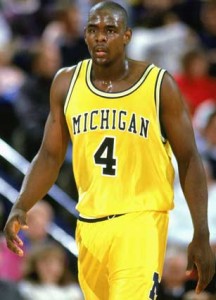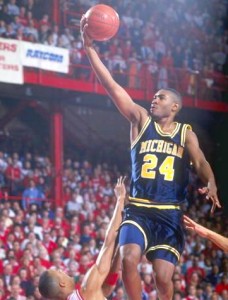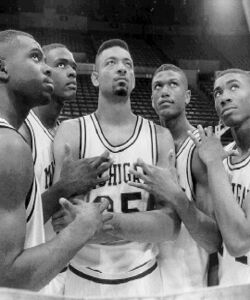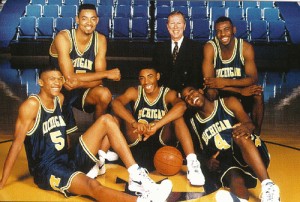Past Imperfect: When the Fab Five Changed the World
Posted by JWeill on March 11th, 2011Past Imperfect is a series focusing on the history of the game. Each week, RTC contributor JL Weill (@AgonicaBoss | Email) highlights some piece of historical arcana that may (or may not) be relevant to today’s college basketball landscape. This week: Michigan’s revolutionary Fab Five.
We fear change. Change can be unannounced, even unwelcome. Or, sure, sometimes we may ask for it, beg for it, look to the heavens for it. But however it comes, when it actually does come, change straight freaks us out. Whether it’s something as small as a job change, as defining as a new child or as big as the first black president, change is maybe the most aggravating salvation there is. Because we curse and are disappointed by that which we once sought and rue the day we begged for what we now fear. So we then ask for change from our change.
In 1991, college basketball was ascendant. Fans were tuning into the annual tournament in record numbers, new modes of media were creating a whole new spectacle out of the Final Four and it was a age before the annual exodus of underclassmen to the pros. This meant that teams were both NBA talented and upperclassmen experienced, and the play on the floor showed that. The tournaments in the last half-decade of the 1980s seemed ever-increasingly better. It was a Golden Age for college hoops. No one was particularly asking for things to get shuffled around.
But you can’t always predict when things will change. And in the fall of 1991, change came to college basketball in the form of five supremely talented freshmen. In particular, five supremely talented freshmen came to the same place at the same time. And with them came change without ever being asked for. Or, rather, it snuck up on everyone. All Michigan coach Steve Fisher was looking for was a change in the fortunes of his basketball team. Two years removed from redefining “interim coach” by winning six straight games and the 1989 national title, Fisher’s team had struggled its way to a losing mark, lacking star power. Michigan needed players, so Fisher went out and got the five best he could get. They just so happened to also be five of the best in the whole country.
Two of them were no brainers, local wunderkinds Fisher — or whomever would have been the Michigan coach — had to lock in. Chris Webber was the nation’s best high school senior: the MVP of the McDonald’s All-American game and a three-time Michigan state champion at Detroit Country Day. Webber was the biggest of the big-time. Michigan had to make sure he was heading to Michigan. There was nothing wrong with Webber; he was the kid everyone wanted. You don’t touch that kid’s game, you just turn him loose and watch.
Jalen Rose was also playing in Fisher’s backyard. Himself a Burger Boy All-American at Southwestern High in Detroit, Rose was as loquacious as Webber was brooding. Rose would be Fisher’s floor general, a tall Magic-like playmaker with moxie coming out his ears. Rose had bloodlines, too, being the kid of Jimmy Walker, a former #1 pick. But Rose didn’t know his father, and besides, Rose wasn’t going to be just someone’s kid. He wouldn’t play in anyone’s shadow, and he wasn’t going to change for anyone. No, you’ll be the one to adapt to him. He was the kind of kid who’d tell you that straight up. Proof? When he was being recruited by Temple he asked John Chaney to change the time of Chaney’s notorious 5 a.m. practices. Chaney, unsurprisingly, said no. Rose ended up at Michigan.
But recruiting kids in your neighborhood, even the ones everyone else is recruiting, is one thing. Going into other people’s territory and landing big fish is a real task. And diving into Chicago to nab the best player there, too? Well, that was quite a feat indeed. But that’s what Fisher and his staff did when they got Juwan Howard, a 6’9” beast with quick feet, soft hands and a sharp mind. Howard was everyone’s top target, particularly Illinois, who had grabbed four of the last five Chicago Players of the Year. But Howard had other plans. His main rival, the one he measured himself against, was now Illinois’ star freshman Deon Thomas, a year older than Howard. Going head-to-head with Thomas twice a year was how Howard would show everyone that he was the best player to come out of Chicago in years, not Thomas. Howard was going to change the way people thought about him. And he was going to do that at Michigan.
On his recruiting trip to Ann Arbor, Howard got to be good friends with a kid from much further away — Plano, Texas, guard Jimmy King. Some think Howard helped recruit King to Michigan, but that doesn’t happen as much as people think. King had to make up his own mind, and King, like his new teammates, didn’t plan on taking a back seat. He was McDonald’s honors-good himself. King was the long range shooter Rose was not. King gave Fisher a weapon from outside. Now all they needed was a glue man.
Maybe you remember who Ray Jackson was, or maybe you don’t. It’s OK if you don’t. Among the Fab Five, Jackson was often the one who wasn’t. He wasn’t a McDonald’s All-American. Wouldn’t end up as an NBA player. Wasn’t a starter until all the others had been already. Jackson was good, really good. But he wasn’t Jalen Rose good, or even Jimmy King good. At least that was the way people thought. Jackson wasn’t a scorer; that was Webber and Rose. He wasn’t a rebounder; that was Howard. He wasn’t a shooter; that was King. No, Jackson was other one. Jackson was the one who did the stuff that needed doing. But every team needs a Jackson. The Fab Five weren’t the Fab Five without him. He would defend, he would ball hawk, he would hit the floor. Back in Texas, Jackson had been everything for his teams. He was the scorer, the dunker, the taker of last shots. Now? He just wasn’t. But that’s OK.
That’s what made the Fab Five so interesting. Five guys recruited at the same time that could all play at the same time. Fisher had recruited a whole team. No one thought that five freshman – even five as good as Michigan’s 1991 class — could resurrect a program’s fortunes overnight. And certainly no one thought all five would take their spots in the starting lineup that first year when there were returning starters. Will never happen. But like anything that forces the world to take notice, to change, it’s not about what people think. What people think changes, good and bad, based on what occurs. And the Fab Five, each with his own talents and personality, was about to change the way people thought about college basketball for good.
And like any landmark moment in history, this one has a before and an after. Before this one, there was order. Before, there was a way things were done. Before was the land of bigger-than-life coaches and stars who subjugated themselves to the team and the coach. But after? It all changed. And now you can’t go back, even if you wanted to.
After any major change, there are folks who would like to go back to the way things were, or at least to go back and do things differently, pay more attention to what was happening. It just happened too fast, and it was too beautiful and ghastly and marvelous and awful to stop. When a revolution happens, you have to stop writing things down the way you used to, stop assuming what is will always be that way and start seeing the way things are going to be.
Basketball might not have wanted the Fab Five, but basketball didn’t have a choice, because the Fab Five just happened. They were five big, talented kids who were pulled together by one fatherly coach and pointed towards the court, where they then learned how to play college basketball in real time. But they also showed college basketball how things were going to be.
Ask many older fans and they’ll insist before was better. Before, you knew what to expect. Before, there was reverence, and respect, and tradition. The kids were the kids and the coaches the coaches and there was order. Of course, people remember what they want to remember. The Fab Five may have just happened, but it happened for a reason. There was an arc of history building that no one could see, one that included Magic and Bird and then Michael and Charles and Public Enemy, too, and Sonny Vaccaro and shoe companies and so much more in and out of basketball. It was all slowly building for years and it finally came into full view in the form of a quintet of oversized kids wearing baggy shorts, black socks and spewing confidence out of their mouths.
The new-look Wolverines were ranked No. 25 in the preseason AP poll, which showed that some folks thought the freshmen were a big deal, but that few thought they could do the unthinkable. Take your time. Build something. Right.
It started off simple enough. Four straight wins over cupcakes. Then came the first test, one the new kids almost aced. It was that first three-point overtime loss at home to then-No. 1 Duke that began to put this Michigan team of young’uns on the map. They actually rose in the polls after the loss. A few weeks later, the Fab Five and teammates claimed a first ranked victim, top-20 Iowa. But the kids would quickly learn the task ahead wasn’t going to just happen. Losses at Minnesota and then at home to Purdue quieted the hype. Then they went down to Indiana and the Hoosiers laid a whipping on the brash young boys by 15.
Thing is, what made the Fab Five important wasn’t just the fact of their existence. Getting five freshmen so good in one class, yes, was unusual, but it was the stuff that came along with them that made people react. Black socks. Shorts slung down so low they grazed the calf. Playing with attitude, talking with attitude. Being with attitude. The kids didn’t know their place, and they didn’t care. Fans ate it up.
But fans don’t fall in love with charismatic losers. They like charismatic losers. But they fall in love with charismatic winners. And the Fab Five, after taking some freshman lumps in the Big Ten that first season, came to that first NCAA tournament looking like seasoned veterans. In their first go-around in an NCAA tournament, the kids didn’t look scared in the least. In fact, they looked great. They flew, they shot, they defended, they soared for rebounds, all with style and sass and a bit of the demon in them. But mostly, they won. Over Temple, over East Tennessee State, over Oklahoma State, and then over Ohio State, exacting a bit of revenge on one of the teams that had bested the Wolverines earlier in the season.
All of a sudden, what do you know? Fisher’s trash talking, alley-ooping, tongue wagging, swaggering freshmen who didn’t know their place? Well, they made a place for themselves. In the Final Four.
If the basketball world had been well aware of what the fabulous freshmen at Michigan had been up to, the NCAA tournament was now a grand stage on which the rest of the sports-watching world was made aware. They had no choice. That was the way the Fab Five worked. That is the way change works. One minute it’s the way you think, and then it’s not. Michigan beat Nick Van Exel and Cincinnati in the semis and prepared for a rematch with Duke, the defending national champs and the team that had helped put Michigan’s brash frosh on the map back in December.
But if this story about change happening has an ending, it’s ultimately about what didn’t happen. The storyline where the fabulous freshmen swaggered their way to the title? Nope. Duke, with its senior all-everythings and future Hall of Fame coach, did a number on the kids. Maybe it wasn’t really a 20-point game, though the scoreboard says so, but it was the experienced hands of Duke that guided it to the national title. Youth may have vigor and talent and fearlessness, but age has wisdom and guile and, well, time. But the boys at Michigan had gotten fingertips on the title, and they weren’t about to let it go so easily.
When all five said they were returning for another shot, the basketball world dubbed them No. 1. That lofty ranking would last all of two games, thanks to – who else — Duke. The Blue Devils got top ranked Michigan at Cameron Indoor in early December and dealt the Wolverines a humbling 11-point loss. But like they had almost always shown, defeat would only spur Webber, Rose and the others to right the wrongs. They would spend the season toppling almost everyone in front of them. Only Bob Knight, that master motivator and oldest of old school coaches, continued to have the Fab Five’s number.
By the time March rolled around this time, Michigan was ready. The Wolverines blasted Coastal Carolina, then squeaked past UCLA in overtime, showing the poise of a veteran squad. They then ran past George Washington and Temple, making their way to a second consecutive Final Four. There, they were to meet Kentucky, who had bum-rushed the field to that point. No matter. Big lights, big time was where the Fab Five shone brightest. Michigan played brilliantly in dismantling the powerful Wildcats’ attack, eventually winning in overtime to set up a return to the championship game. This time, they seemed to insist, youth would be served. But waiting for Michigan this time? Another ACC team with a balanced veteran roster and led by a venerable, A-grade coach: North Carolina.
The final with North Carolina is still an all-time classic. The Tar Heels, powered by All-American center Eric Montross – the player Fisher had tried but failed to get the season before he got the Fab Five, the player whose father and grandfather had played for Michigan – and a stable of athletic, skilled shooters and wings, had no intention of letting the Brash Five finish off their glory story. Both teams played hard, physical basketball. But in the game’s waning moments, Chris Webber – a player whose exploits on the court had been legendary to that point – made a play he’ll never outlive. With the ball and in danger of traveling or getting tied up and trailing by two points, Webber spun around to an official in the corner and called a timeout the Wolverines didn’t have. The resulting technical foul and change of possession ended the Fab Five’s title hopes, and effectively ended the Fab Five itself.
For all the talk of victory and change surrounding the Fab Five, the story itself has a stunning if sadly familiar ending. As expected, Webber went pro, getting selected first overall in the NBA Draft. Howard and Rose stuck around and reached the round of eight the next year, but then they, too, reached for professional dreams. King and Jackson finished out their careers as co-captains, no longer the forgotten members of the Fab Five, now the leaders of a young team filled with promising underclassmen.
But in 2002, investigations into Michigan booster Ed Martin revealed that Webber, along with three players on later Wolverines squads, had taken money from Martin. Webber’s implication in the scandal would wipe out the official records of those two seasons at Michigan.
As far as the NCAA is concerned, the Fab Five never happened. But everyone who saw it knows it did. And they also know that monumental changes took place in the game, in the very way it appeared on the court, the way it was played, the way kids were recruited and treated and processed. The Fab Five had made it a player’s game again, however accidentally. Just by being who they were, they had altered the landscape in ways few players, and even fewer teams, will ever do.
The brash style the Fab Five performed with – and they were performances in their way – the ways they looked, talked and acted, were now the new norm. Coaches had to adjust to players in a way that simply hadn’t happened before. Whether folks liked it or not, the Fab Five had made basketball hip hop, made it young again. Sure, there were still plenty of geezers in short shorts. There were still ways of doing things that were accepted as right, as the way things are. But there was also a new way: the Fab Five way. After a while, everyone wore the baggy shorts, and the black socks, and hip hop and basketball became together a potent force. But if history has taught us anything, it’s that even when the new way eventually becomes just the way it is, change always comes calling again, whether you like it or not.














































